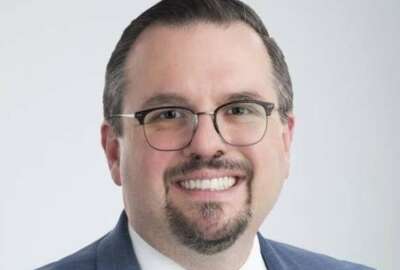

Hubbard Radio Washington DC, LLC. All rights reserved. This website is not intended for users located within the European Economic Area.
What exactly is a false claim for purposes of federal contracting and if the government goes after a contractor?
Best listening experience is on Chrome, Firefox or Safari. Subscribe to Federal Drive’s daily audio interviews on Apple Podcasts or PodcastOne.
What exactly is a false claim for purposes of federal contracting and if the government goes after a contractor? The Supreme Court recently decided not to weigh in on a split lower court decision regarding standards for what exactly makes a false statement. To explain what happened and what it means to federal contractors, McGuireWoods law firm partner Michael Podberesky joined Federal Drive with Tom Temin.
Interview transcript:
Tom Temin: Mr. Podberesky, good to have you on.
Michael Podberesky: Thank you for having me.
Tom Temin: Now, you have found or you’re interpreting a Supreme Court ruling, which I guess they decided not to take on a case where three different lower courts had slightly different views of what constitutes a false claim. Tell us briefly about those three and the differences between them.
Michael Podberesky: That’s correct. In late February Supreme Court declined to address a circuit split regarding the standard for establishing that a statement material to a claim for payment is false, as that term is defined in the False Claims Act. The appeals were from two decisions, one in the Third Circuit and one in the ninth circuit. And both of those were also closely related to a third decision from the 11th circuit, the 11th circuit decision, United States versus Sara care involved claims for hospice care. The full statement at issue, there were certifications that patients were terminally ill and therefore eligible for hospice care. The Eleventh Circuit ruled that for a statement to be false, there needs to be an objective falsity, and a mere difference of opinion is not sufficient to establish the falsity element required to prove a false claim. The Third Circuit in a another hospice case in the United States x rail routing the care alternatives ruled the exact opposite that the False Claims Act does not require evidence of an objective false statement. And physician opinions like any other opinion can be false can be fraudulent, and there’s no need to prove an objective false statement. The Ninth Circuit in a case involving hospital admissions ruled it tried to split the difference between the two opinion did, it also ruled that there was no need to prove an objective false statement. But it said that the Eleventh Circuit opinion was really unique to the facts and circumstances of hospice, where it’s an inherently speculative certification, you’re trying to determine if someone is terminally ill as defined by the Medicare regulations, that means someone is likely to die within the next six months. The Supreme Court in late February denied petitions for certiorari in the third and ninth circuit decisions.
Tom Temin: Got it. So therefore, what, in some cases, a court said that a statement that could later be found to be not true, even though it might have been thought of as true at the time they declared those patients terminal and they lived five more years or something. They were wrong, but they felt that they were right at the time. And so what should contractors do now that there are these conflicting lower court rulings?
Michael Podberesky: They need to be vigilant because depending on what jurisdiction you’re in, you could have a varying standard for assessing certification decisions. And though these three cases all involve physician certifications in the healthcare context, there are certifications in all types of government contracting certifications that certain services or repairs were required certification that the services were repairs, or maintenance was done according to spec or industry standards. So it’s critical that those certifications are completed in a diligent, thoughtful manner in an environment that is free from inappropriate influences. And companies should ensure they have a robust compliance function. And part of that compliance function is auditing the certification process to make sure the certifications are supported by data in the records and are completed in an appropriate manner. If a certifying official is certifying 100 claims or 50 medical records in a half hour, that should appear like rubber stamping and that should cause concern. On the other hand, if the certifying official is paid per certification, or has some other sort of inappropriate incentive scheme in place, that also may call into question the validity of the certification itself.
Tom Temin: Well, we’ll leave the rubber stamping to the torque bar. And what about in the areas where professional services might be contracting. And there is a statement that something will take a certain amount of time but it ends up to take much longer or in the case of cybersecurity that a company certifies that their systems are safe to hold government data, they are later breached. It was made in good faith, those types of certifications, but they turn out to be either undone or mistakenly certified. But that puts you in a false claim situation anyway.
Michael Podberesky: Well, the false claims has four elements, and one of the elements is a false statement. But another element is that this is a knowledge requirement, or what’s called the scienter requirement that the individual who made the false statement had to make it with knowledge that the statement was false. And in the False Claims Act context, reckless disregard for the truth or deliberate ignorance of the truth, sort of the ostrich with his head in the sand. That’s sufficient evidence of knowledge to satisfy the elements for a False Claims Act claim. But to the extent that a speculative certification ended up being proven not true, that in and of itself is not sufficient to make out a False Claim Act claim. There’s this relief out that it has to be done with the requisite knowledge.
Tom Temin: And what the split lower court decisions showed, though, is that anything can happen depending on the jurisdiction, even though you’re dealing with in this case, I presume the same agency, the Centers for Medicare and Medicaid Services. And so that’s where compliance would come in, there must be some way of couching these things in the certification such that you’ve got a way out, if it turns out that different circumstances end up ensuing.
Michael Podberesky: Yes, and let’s take the hospice context, just because as an example, just because someone lives longer than six months, doesn’t mean the certification was false, right? The many certifications are inherently speculative individuals making considered professional judgment with the best information they had at the time, that ought to be protected. And certifying officials should be confident in those decisions, so long as they are making reasoned judgments for the right for the right reasons, if you will, and the materiality and the knowledge of the False Claims Act will serve to protect officials who are acting in good faith. That said, there is a varying standard, and at least in the 11th circuit, particularly in the hospice context, there may be requirement to approve an objective falsity, which is a higher threshold for plaintiffs for the government or a whistleblower to overcome.
Tom Temin: Yes, because in other medical settings, there are obvious fraud claims. From time to time someone says they’re incapacitated and can’t walk and someone sees them out in the parking lot pulling off the neck brace and reaching for the golf clubs and hopping around. This kind of thing happens in disability claims. That’s a totally different situation.
Michael Podberesky: That’s correct. Even in the Eleventh circuit, that would clearly be an objective. Also, if someone says they can’t walk and then there’s video evidence of them running a marathon, that’s an objective little statement and will still be actionable.
Tom Temin: Bottom line then, advice is to just be vigilant and make sure your compliance people check with the way you state certifications.
Michael Podberesky: That’s exactly right. The government takes certifications very seriously. It relies on those certifications when making a determination whether to pay an invoice and it expects that the certifying officials are exercising, reasoned, good faith judgment. That doesn’t mean it expects them to be perfect and always 100% correct. But it expects the process to be a valid defensible one. So no matter what circuit or jurisdiction a company is in, they ought to have a robust compliance program that focuses particular attention on certifications and the process they were created. The government does not view certifications the way you and I might view signing a credit card receipt after we buy our lunch at the office. They view those certifications very seriously and they rely on them and they expect the company making those certifications to invest appropriate time and good faith effort in.
Tom Temin: Attorney Michael Podberesky is a partner at McGuireWoods. Thanks so much for joining me.
Michael Podberesky: Thanks again for having me.
Copyright © 2024 Federal News Network. All rights reserved. This website is not intended for users located within the European Economic Area.
Tom Temin is host of the Federal Drive and has been providing insight on federal technology and management issues for more than 30 years.
Follow @tteminWFED


